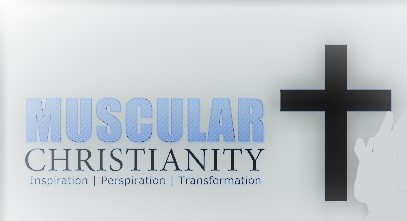
We’ve written on Muscular Christianity before, but it is worth revisiting the idea, and to press beyond the introductory blog that also appears on this website. I hope here in to explore the axioms of what I mean by a ‘muscular Christianity’ which is someone what a pretentious title I accept; but I needed an adjective to help contrast what I am trying to talk about it from three other kinds of things; these three other will be outlined shortly.
Christianity is currently being expressed in three broad way which can be classified as follows Civil Religion, Club Church, and NGO; none of these are the fullness and the richness of the faith. Civil Religion, is the mere reduction of Christianity to its rituals, which are then co-opted to mark the rhythms of peoples lives and the state; devoid of any real muscle. Club Church, is a description that suits many modals of Church today, a Sunday club that gathers on a Sunday and runs a few extra events on top during the week, that people opt in and out of; and often positions itself a place where you can make friends and meet people; missing any real muscle. When I say ‘Christianity as NGO’ I mean those fellowships and Christians who have reduced Christianity to a mere charity; often meeting some social need in society; with very little connection to a muscular Christianity. Now these three can and do – in some fellowships – have over lap, a Church can be both NGO and Civil Religion; the best we have so far, are a combination of all three; but all of this falls far short of the full panorama of a Christian world view. So now I have annoyingly introduced the world ‘muscle’ into this article; let me lay out for you what are the axioms of what I mean by muscular Christianity.
Axiom one: we believe that ‘being’ a Christian is what the prophets and the apostles say that it is: to be a Christian, is to be part of a new humanity, a new identity, a royal priesthood a people set apart unto YAHWEH; and who are proud of their identity; as the disciples of Jesus. We do not seek to place our identity in our ethnicity, gender, class, ability, or other matrix into which people may seek to construct their identity. We reject, individualism and its incumbent god of the self; we are the CHURCH; the people of GOD, the body of Christ; His chosen bride, his prophets, priests, apostles, teachers; and our allegiance is to him above every state and institution. We are not British or European; or any other nationality; and our loyalty is to the global Church above that of any other loyalty.
Axiom two: as a people; adopted together by the grace of GOD; we have the duty, to live out our own values and beliefs; without shame or discouragement, we will not shrink from living them out and nor will we hide them away. We have our own traditions, customs, and order of values, we have our own history. We root and live out our humanity; according to our beliefs, values, customs and traditions; as informed by the history of our ‘people’ the Church. We do so economically, culturally, politically and socially. We do not need nor require peoples permission to do so; and we are willing to uphold our beliefs, values, customs and traditions whatever the cost; as it is in these we witness to the resurrection of our Lord Jesus Christ. We believe we can do this best; by living in close geographical proximity to one another, we encourage therefore Christians of the whole body to move into and collectivise geographically.
Axiom three: we express this as disciples of Christ, in every sphere of our lives, in our economic and political choices, in our art, culture, in our relationships with others. We believe our bodies and our time belong to GOD; as does the whole of creation; and as such our discipleship in the Lord, is also a discipleship in how to use our positions of authority, influence and power to bare, to expand the kingdom of GOD and build up his Church. We look to the history of the Church to guide us, in how we live these things out today.
Axioms four: We believe in the ancient creeds of the Church; and uphold the doctrines of historical Christianity, without seeking to change or to alter them; or modify them to make them acceptable to the world. We centre our faith on the divine and glorious Trinity; for whom the whole of our lives we see as an oblation and living sacrifice to His praise and glory! We see the writing of the Church fathers and mothers of each age and generation a succour and support on how to live the Christian life; they are our teachers.
Axiom five: We practice the cultivation of virtue as understood by the Christian faith; as the guiding principle of moral discourse. This is not to ignore other modulations and framings of moral practice; but to use all valid moral framing and practices as a mean to grow in virtue; and decrease vice in our lives and the world around us.
Axiom six: We believe in a theology of solidarity within the Church. The Church being one body; and one people, owes to itself the highest loyalty and solidarity. Christians should work together; to care for, support, defend, and encourage one another, at ever level, from the individual, local, city, nation and internationally; the plight of one Christian is the plight of every Christian, the suffering of one is the suffering of all; to this end; our structures and organisations, the very rhythm of our lives and all its possessions, resources and energies; are to be brought to bare to build up the body of Christ; and to grant it safety and security.
Axiom seven: We have an ecumenical theology, which equates the Church, not to her institutions (also called churches, communions) but as the body of believers. We therefore, accept our differences, without denying them, and believe that all such matters that are not primary doctrines; are not worthy of divisions particularly in terms of our political, economic and social unity. That the worship and glorification of the blessed trinity is of such great importance that other ‘errors’ as one or other part of the body, can be tolerated within a context of over all unity. That such differences sit within levels of acceptable theological conclusions, even whilst not denying that will ultimately be one true way of viewing the particular divisive subject.
Axiom eight: we believe in a theology of dominion; that Christ should rule over all and in all; and that the Church should be triumphant over all her enemies in every sphere; we believe in the complete saturation of all things by the discipleship of Christ. Therefore, no sphere should be left untouched; the heights of politics, economics, information sharing and learning, arts and culture, social customs, values, traditions, and the institutions of every kind; should be guided by the Christian narrative.
Axiom nine: we have a theology of martyrdom. We do not shrink from the battle Christ has called us to and look forward with unspeakable joy to the sufferings of struggle that lay ahead; we remember the martyrs who go before us; we honour and celebrate their memory; we celebrate the martyrs of the day; and we stand in solidarity with those who are suffering for the sake of our Lord; and more than this, we seek to press forward the boundaries of the Church and Kingdom; until we ourselves find the fray.
Axiom ten: We accept a masculine spirituality; that upholds personal responsibility and the shouldering of responsibility without complaint. That men should honour, protect and defend; and lead within the Church. Therefore the organisation and institutions of the Church should reflect this. We reject pacifism as a moral obligation but understand it to be a moral choice. We very much understand the world is a battle ground between the forces of the Church; and those that reject her. To this end we cultivate the chivalric code within ourselves as men. This is not deny that their should also be a feminine spirituality also – but in our time – this is fully expressed; and requires no special mention.
Axiom eleven: whilst doctrine; and values of the faith; as well as the cultivation of virtue do not change, and history collects, customs and traditions; can and should change according their utility. Therefore, the body of Christ, should always be willing to reform any custom or tradition that needs to be – given the circumstance.
Axiom twelve: We understand that the personal spirituality of the Christian is expressed in what is called vocation; and that a vocation can be any godly thing. Therefore that Christians, should be encouraged to find their vocation and then to live it out within the body of Christ. We say this, knowing that not every vocation can lead to an income; and so some vocations need to complimented with ‘tent making’.
These axioms lay out for you with the other article on this blog; what I mean when I am talking about Muscular Christianity. I hope you find it useful and edifying.

